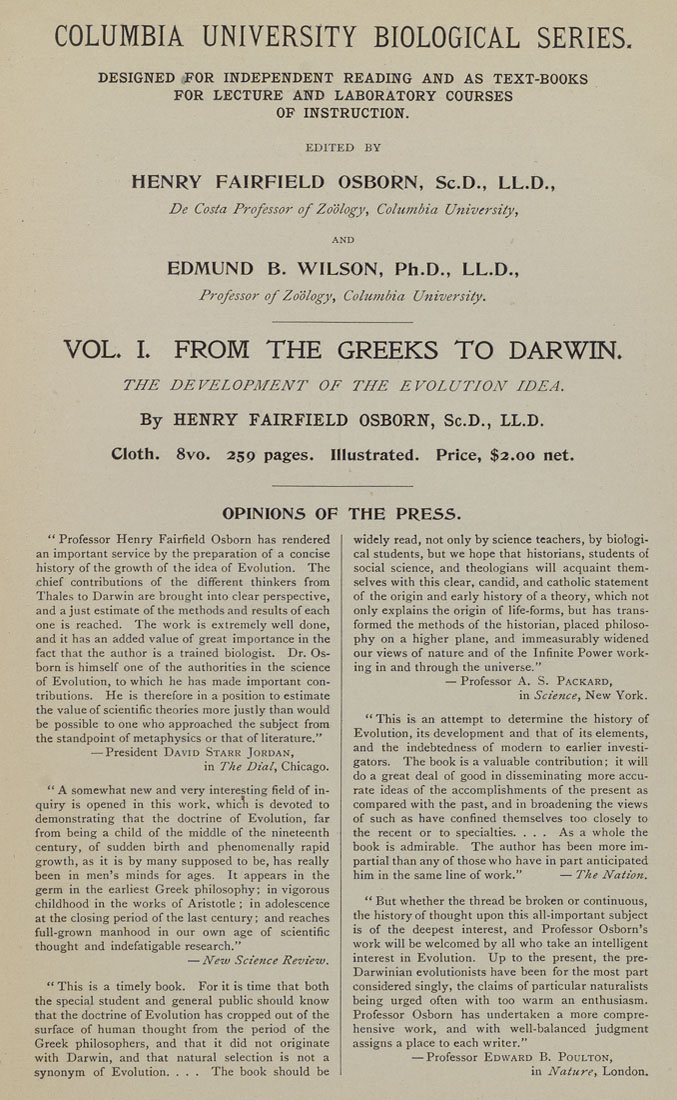COLUMBIA UNIVERSITY BIOLOGICAL SERIES.
DESIGNED FOR INDEPENDENT READING AND AS TEXT-BOOKS
FOR LECTURE AND LABORATORY COURSES
OF INSTRUCTION.
EDITED BY
HENRY FAIRFIELD OSBORN, Sc.D., LL.D.,
De Costa Professor of Zo'dlogy, Columbia University,
EDMUND B. WILSON, Ph.D., LL.D.,
Professor of Zo'dlogy, Columbia University.
VOL, L FROM THE GREEKS TO DARWIN.
THE DEVELOPMENT OF THE EVOLUTION IDEA.
By HENRY FAIRFIELD OSBORN, Sc.D., LL.D.
Cloth. 8vo. 259 pages. Illustrated. Price, $2.00 net.
OPINIONS OF THE PRESS.
" Professor Henry Fairfield Osborn has rendered
an important service by the preparation of a concise
history of the growth of the idea of Evolution. The
chief contributions of the different thinkers from
Thales to Darwin are brought into clear perspective,
and a just estimate of the methods and results of each
one is reached. The work is extremely well done,
and it has an added value of great importance in the
fact that the author is a trained biologist. Dr. Os¬
born is himself one of the authorities in the science
of Evolution, to which he has made important con¬
tributions. He is therefore in a position to estimate
the value of scientific theories more justly than would
be possible to one who approached the subject from
the standpoint of metaphysics or that of literature."
— President David Starr Jordan,
in The Dial, Chicago.
" A somewhat new and very interesting field of in¬
quiry is opened in this work, which is devoted to
demonstrating that the doctrine of Evolution, far
from being a child of the middle of the nineteenth
century, of sudden birth and phenomenally rapid
growth, as it is by many supposed to be, has really
been in men's minds for ages. It appears in the
germ in the earliest Greek philosophy; in vigorous
childhood in the works of Aristotle ; in adolescence
at the closing period of the last century; and reaches
full-grown manhood in our own age of scientific
thought and indefatigable research."
— New Science Review.
" This is a timely book. For it is time that both
the special student and general public should know
that the doctrine of Evolution has cropped out of the
surface of human thought from the period of the
Greek philosophers, and that it did not originate
with Darwin, and that natural selection is not a
synonym of Evolution. . . . The book should be
widely read, not only by science teachers, by biologi¬
cal students, but we hope that historians, students of
social science, and theologians will acquaint them¬
selves with this clear, candid, and catholic statement
of the origin and early history of a theory, which not
only explains the origin of life-forms, but has trans¬
formed the methods of the historian, placed philoso¬
phy on a higher plane, and immeasurably widened
our views of nature and of the Infinite Power work¬
ing in and through the universe."
— Professor A. S. Packard,
in Science, New York.
" This is an attempt to determine the history of
Evolution, its development and that of its elements,
and the indebtedness of modern to earlier investi¬
gators. The book is a valuable contribution; it will
do a great deal of good in disseminating more accu¬
rate ideas of the accomplishments of the present as
compared with the past, and in broadening the views
of such as have confined themselves too closely to
the recent or to specialties. . . . As a whole the
book is admirable. The author has been more im¬
partial than any of those who have in part anticipated
him in the same line of work." — The Nation.
" But whether the thread be broken or continuous,
the history of thought upon this all-important subject
is of the deepest interest, and Professor Osborn's
work will be welcomed by all who take an intelligent
interest in Evolution. Up to the present, the pre-
Darwinian evolutionists have been for the most part
considered singly, the claims of particular naturalists
being urged often with too warm an enthusiasm.
Professor Osborn has undertaken a more compre¬
hensive work, and with well-balanced judgment
assigns a place to each writer."
— Professor Edward B. Poulton,
in Nature, London.
|








